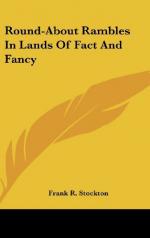[Illustration]
We have also friends among the feathered tribes, who are not quite so intimate and sociable as those to which we have already alluded, but which still are very well deserving of our friendship and esteem. For instance, what charming little companions are the canary-birds! To be sure, they would not often stay with us, if we did not confine them in cages; but they seem perfectly at home in their little wire houses, and sing and twitter with as much glee as if they were flying about in the woods of their native land—or rather, of the native land of their forefathers, for most of our canary-birds were born in the midst of civilization and in cages.
[Illustration]
There are some birds, however, no bigger than canaries, which seem to have an attachment for their masters and mistresses, and which do not need the restraint of a cage. There was once a gold-finch which belonged to a gentleman who lived in a town in Picardy, France, but who was often obliged to go to Paris, where he also had apartments. Whenever he was obliged to go to the great city, his gold-finch would fly on ahead of him, and, arriving there some time in advance of the carriage, the servants would know that their master was coming, in time to have the rooms ready for him. And when the gentleman drove up to the door he would generally see his little gold-finch sitting on the finger of a cook or a chamber-maid, and twittering away as if he was endeavoring to inform the good people of all the incidents of the journey.
Some of these little birds, however, which are very friendly and comparatively sociable as long as they are not troubled and annoyed, are not only able to distinguish their friends from their foes, but are very apt to stand up vigorously in defence of their rights. Those little sparrows, which hop about so cunningly in the streets of many of our cities, understand very well that no one will hurt them, and that they may pick up crumbs wherever they can find them. But let a few boys get into the habit of throwing sticks and stones at them, and the little things will leave that neighborhood as quickly as if the rents of all their tiny houses had been raised beyond their means.
[Illustration]
Magpies, too, are very companionable in their own way, if they are well treated; but if a boy should undertake to steal away with one of their nests, when it was full of young ones, he would run a very great risk of having his eyes picked out.
There is a feathered friend of ours who keeps himself so secluded, at least during the day-time, that he is very apt to escape our notice. I refer to the owl.
It may not be supposed, by some, that the owl is a friend of mankind, and I am perfectly willing to admit that very often he acts very much like an enemy, especially when he kills our young chickens and turkeys. But for all that, he has his good points, and very often behaves in a commendable manner. If you have a barn or a house that is overrun with mice, there is nothing that will be more certain to drive them out than an owl. And he will not be so apt to steal your milk or kill your canary as many of the cats which you have taken into your family without a recommendation.




